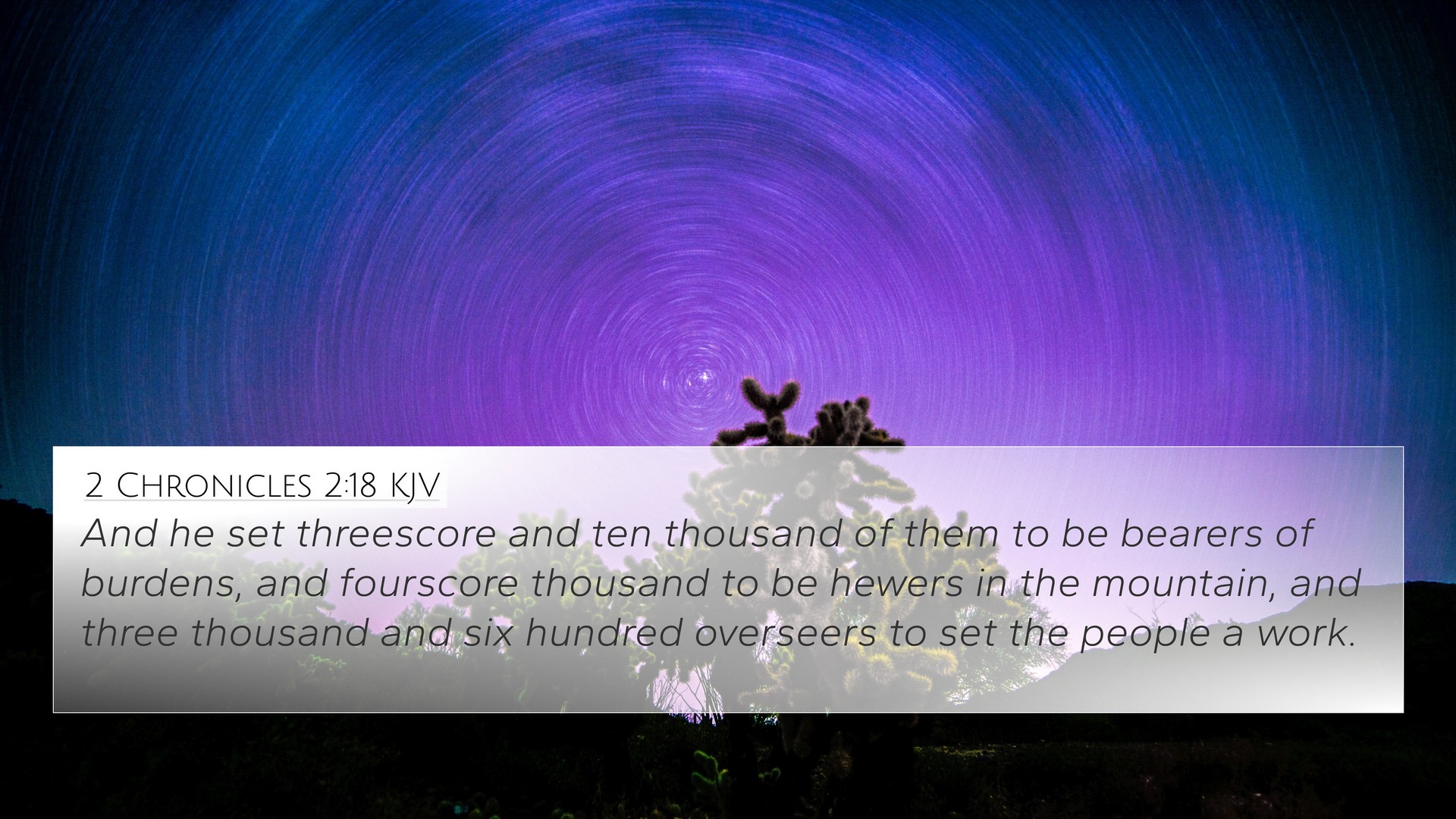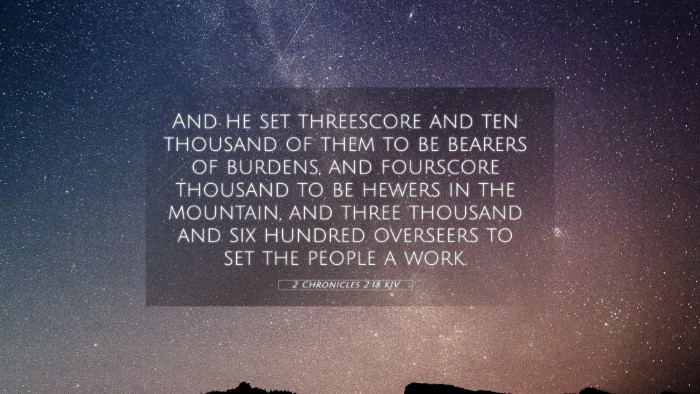Understanding 2 Chronicles 2:18
Verse: "And he set three thousand and six hundred to oversee them." - 2 Chronicles 2:18
The verse discusses King Solomon’s organization of labor for the construction of the Temple in Jerusalem. This significant undertaking required a sizable workforce, and Solomon appointed a considerable number of overseers to manage the various tasks involved.
Summary of Insights
This verse highlights several key themes and lessons as interpreted by public domain commentaries such as those by Matthew Henry, Albert Barnes, and Adam Clarke:
- Divine Guidance in Organization: Solomon's meticulous planning showcases a principle of divine order. His decision to appoint overseers reflects a commitment to structured labor which is essential in large undertakings (Matthew Henry).
- The Role of Leadership: The appointment of overseers emphasizes the importance of leadership in executing large projects. Each overseer was responsible for managing the workforce effectively (Albert Barnes).
- Preparation for God's Work: Solomon's organization serves as a prelude to the Temple's construction, illustrating that preparation and foresight are fundamental to successful spiritual endeavors (Adam Clarke).
- Resource Allocation: The decision to employ three thousand six hundred overseers also indicates a significant allocation of resources, underlining the magnitude of the Temple project (Matthew Henry).
- Symbolism of Numbers: The specific number of overseers may hold symbolic meaning related to completion and divine governance, inviting deeper analysis into the significance of numbers in Scripture (Albert Barnes).
Cross-References for 2 Chronicles 2:18
There are numerous Bible verses that connect to 2 Chronicles 2:18, enhancing our understanding through cross-referencing:
- 1 Kings 5:13 - Solomon's workforce is detailed, connecting to the overarching narrative of the Temple's construction.
- Exodus 31:1-6 - The appointment of skilled individuals in craftsman roles, showing biblical precedent for organized labor in holy work.
- Proverbs 24:27 - The importance of preparation before undertaking a significant project, highlighting wisdom in organization.
- Nehemiah 4:9 - Reflects on the need for vigilance and cooperation when rebuilding, important for understanding communal efforts.
- Matthew 25:14-30 - The parable of the talents illustrates stewardship and responsible management of resources, applicable to Solomon's oversight.
- 1 Corinthians 14:40 - The principle of doing things decently and in order, reflecting the necessity of organization in worship.
- Hebrews 3:3 - Discussing the superiority of Christ over Moses, highlighting the importance of the Temple where Solomon's work contributed to God's plan.
Thematic Connections
This verse invites readers to consider broader themes in Scripture concerning leadership, preparation, and community cooperation:
- Biblical Leadership: The role of leaders in the Bible, such as Moses, David, and Jesus, parallels Solomon's actions in guiding his people (2 Samuel 23:1-4).
- Community Building: The emphasis on overseeing labor embodies the notion of working together for a common goal, as seen in Acts 2:44-47.
- Spiritual Workmanship: The relationship between physical building (the Temple) and spiritual edification (the Church) presents a rich theme found throughout the New Testament (Ephesians 2:19-22).
Inter-Biblical Dialogue
The connections between this verse and others reveal a rich tapestry of inter-Biblical dialogue:
- How Solomon's labors connect with David's efforts in organizing materials for the Temple (1 Chronicles 22:2).
- Links between the construction of the Temple and the New Testament's emphasis on believers as a spiritual house (1 Peter 2:5).
- The comparison of oversight in both spiritual and secular realms, showcasing the holistic nature of faith affecting all aspects of life (Romans 12:1-2).
Conclusion
2 Chronicles 2:18 encompasses themes of organization, leadership, and the preparation necessary for significant spiritual undertakings. Through comparative Bible verse analysis and thematic connections, we glean valuable insights into the nature of divine work and the necessity of proper oversight.
In studying this verse, one not only appreciates its immediate context but also engages in a broader exploration of scripture, uncovering the intricate relationships between the Old and New Testaments. Engaging with these cross-referenced themes enriches our understanding of Biblical teachings on leadership, community, and spiritual edification.



